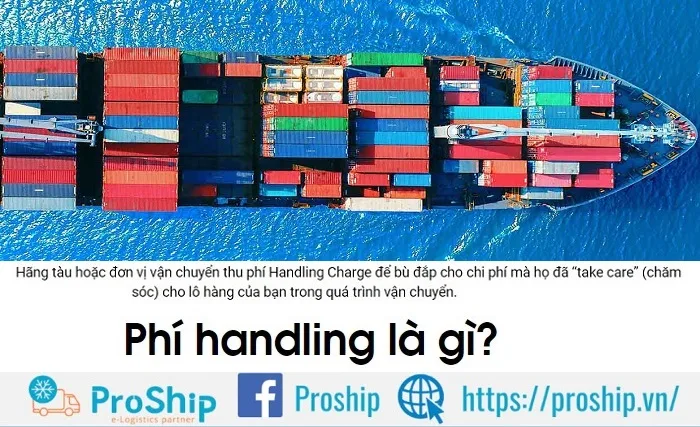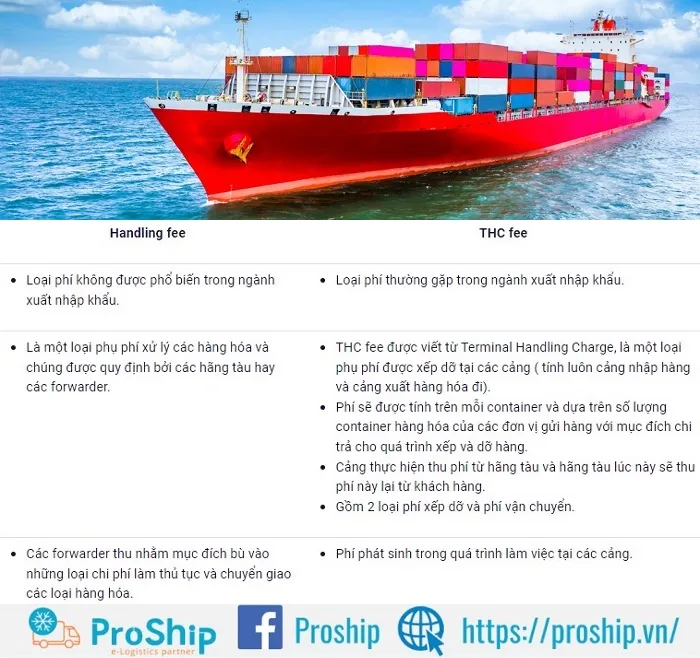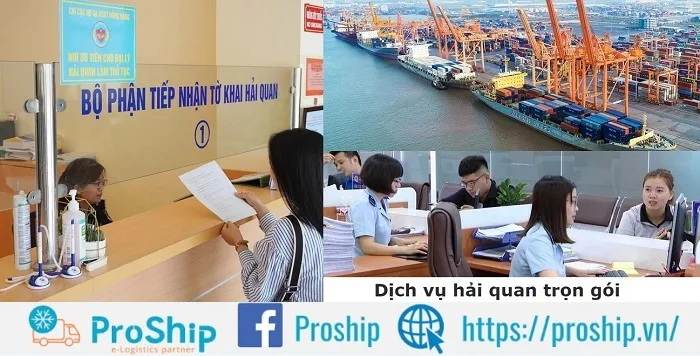x You are planning to transport, import and export goods by sea, need to learn about related fees and surcharges?
x Have you heard of Handling fee, THC fee but don't understand what these terms are?
What is involved? What are the structural characteristics,...? x Does your business need to hire an Import-Export Entrusted Service and need to find a unit with experience, good prices, and commitment to quick customs clearance?
In international trade activities, most imported or exported shipments must pay a handling fee. To clarify what handling fee is, Proship.vn will synthesize knowledge from many reliable sources to help readers have an accurate overview of this term and knowledge related to Handling fees.
At the same time, Proship Logistics is also proud to be one of the leading professional and reputable Customs Clearance Units and Customs Agents at seaports nationwide. Therefore, all your problems regarding customs procedures for export and import goods as well as support for import and export documents are quickly supported, ensuring customs clearance time at the port.
📦 Hotline contact shipping
🧭 Central
What is Handling Fee? Characteristics of Handling fees
What is handling fee?
In order for your shipment to be "taken care of" carefully, paying handling fees is necessary when businesses want to import and export goods internationally. Handling fee, English name "Handling Fee" is a type of cargo handling fee regulated by the Forwarder or Shipping Line. Shipping lines/forwarders will collect handling fees from the shipper or consignee to compensate for the cost of "take care" of the shipment.
There are a number of Handling fees that are often mentioned such as shipping line/forwarder agent fees, D/O fees and manifest declaration fees, customs declaration fees, depreciation costs, etc.
These Handling fees need to be paid to maintain the Agent network for shipping units worldwide. While the domestic Forwarder Company works with their branches in other countries around the world to complete the above services, they must pay those branches an amount of money to perform the work on their behalf. .

Features of Handling fee
Handling fee or Handling charge will have the following characteristics:
- A fee that the goods owner or exporter must pay to the shipping company or forwarder to ensure that the goods are "taken care of" well;
- This fee appears when forwarders in Vietnam transact with their branches abroad to establish their representative status in our country;
- The reason for collecting the fee is because when the goods belong to the list of designated goods as above, the shipping fee will not include a commission for the forwarder, so to ensure their rights, the forwarder is forced to collect the above fee;
- Implementation costs include customs declaration fees, B/L registration fees, D/O registration fees or other procedures;
- Shipping lines will usually pay the master fee so you do not have to pay the handling charge. But when the goods are on the designated list via forwarder, businesses are forced to pay handling fees and ocean freight surcharges;
- The branch representative accreditation process is carried out and the fee will be included in the handling fee.
Find out detailed information about the Handling fee
In order to clarify issues related to Handling fee, Proship shares content related to the structure, similarities and differences between Handling Fee and THC Fee as well as whether or not Handling fee should be included in shipping fees. As follows:
Structure of Handling Fee
The handling charge is divided into the following 2 fees:
Handling fee
Additional fees for handling goods. This fee is used to cover and maintain the carrier's agent network around the world. Maintain a connection network into a common information network between shipping units around the world to exchange and receive goods quickly and conveniently.
The carrier must pay fees such as phone charges, documents, documents, and other costs. To cover these fees, it is mandatory for the Carrier to calculate the handling fee from the customer's fee.
THC Charge (Terminal Handling Charge)
Surcharges for loading and unloading at the port, calculated per container. This cost is calculated based on the number of cargo containers of the shipper. Cost of loading and unloading goods at the port. At this time, shipping units must pay unloading fees at the port to compensate for this fee. Boat owners collect THC surcharges from their customers.
What are the similarities and differences between Handling Fee and THC Fee?
Proship will point out the similarities and differences between Handling fee and THC fee:
- Handling charges will generally be divided into two types of fees: THC fee (Terminal Handling Charge) and Handling fee. Because the names are somewhat similar, these two types of fees are often confused with each other. THC fee is a common fee in import and export, but handling fee is less common;
- THC fee (Terminal Handling Charge): Is a loading and unloading surcharge at the port (including both import and export ports). Fees will be calculated per container and according to the number of cargo containers of the shipping unit for the purpose of paying for loading and unloading goods at the port;
- The port will collect this fee from shipping lines and shipping lines will collect this fee from customers. THC fees will usually include 2 types of fees: Container loading and unloading fees and container transportation fees from the wharf to the container yard;
- The company will collect Consignee's THC fee at the Port of Loading for delivery terms (EXW, FCR, FAS) and Shipper's fee at the Port of Discharge for terms (DAT, DDP). ).

=> From the above characteristics, it can be seen that THC fees are different from Handling fees. THC fee is a fee incurred during work at the port, while Handling fee is a fee collected by the Forwarder to offset the costs of procedures and goods delivery.
Should Handling fee be included in shipping fee?
In fact, people will separate handling fees and freight charges for the following reasons:
- Shipping lines and forwarders need to separate freight and handling fees to make it easier to calculate revenue and expenses. Limit losses and limit the impact of currency fluctuations. Businesses will pay these surcharges in local currency but freight is calculated in US dollars;
- For shippers, separating freight and surcharges will help them know how much actual freight is applied to the shipment. From there, balance packaging fees and other costs incurred during the transportation process;
- The separation of two types of freight and handling surcharges aims to increase competition in freight prices. The shipping company or Forwarder unit will quote the freight to the customer at a reasonable price without regard to the accompanying surcharges.
📦 Hotline contact shipping
🧭 Central
Some other surcharges in international transportation you need to know
Proship has clarified what the term handling fee is and related knowledge. In addition to handling fees, shippers need to know a number of other surcharges to estimate the total cost to accurately price the shipment and avoid unnecessary losses. Specifically:
- D/O fee (Delivery order fee): Delivery order fee, corresponding to a b/l (bill of lading), there will be this fee for order delivery included in goods imported from FCL (Full container load), LCL (less than container load), air cargo and even bulk cargo. This fee will be paid by the consignee for incoterms (EXW, group F, group C, DAT) and the remaining terms are paid by the exporter. This fee is not only for issuing a D/O order to collect payment, but also for declaring a manifest and picking up the order (if there is a House B/L).
- DEM/DET fee (Demurrage/Detention fee): Storage fee/cont. When the container is in the port after the allowed date, this fee will be charged. Container storage fee is when the container is brought to the warehouse for packing or returning goods but If you stay longer than the shipping company allows, you will be charged a fee.
- CFS fee (Container freight station fee): Fee for handling retail cargo (including loading and unloading goods from container to warehouse or vice versa; storage fee for retail cargo, warehouse management fee).
- B/L fee (Bill of lading fee): Fee for issuing B/L bill of lading. When receiving goods, the carrier will issue B/L. Issuing a bill is not only about issuing a B/L and then collecting money, but also includes notifying the importing country agent about the B/L, order tracking fees, and order management.
>>See more: What does a set of import documents include?
Businesses need to hire Sea Import-Export Entrustment Service, which unit is the best and most reputable?
PROSHIP LOGISTICS we are proud to be a unit specializing in providing Trusted Import and Export Services for Sea Freight with Prestige - Professional - Competitively cheap prices, with high trust from many customers including Individuals and Private Investors. Individuals, Businesses, Corporations. It is important that we always have a team of personnel who are well-trained in customs operations - customs clearance of goods, so all fees and surcharges (including handling fees) are clearly understood and will be discussed. Consult and answer questions in advance for goods owners and businesses to understand clearly so they can have a reasonable budget plan.
As a customs clearance unit, Proship will NOT APPEAR on any documents of the customs declaration dossier. The mission of our seaport HQ declaration unit is to create a declaration using our own software, then use the Customer Token to sign the declaration, and use the goods owner's introduction letter to complete HQ procedures. The Goods Owner/Enterprise must use their DIGITAL SIGNATURE to sign (remotely), or send false documents, etc. For the Customs Office, the Import-Export Declaring Unit, we are the Goods Owner's people.
As a customs declaration agent, we will use a valid DIGITAL SIGNATURE to declare customs and be responsible for the content declared on the declaration along with the import-export enterprise; On behalf of the enterprise, carry out import and export procedures for goods according to the seaport customs declaration contract signed between the two parties; The name and code of the Proship Customs Agent are shown on the declaration and the customs system.

Customers who declare seaport customs
Proship targets the following customers after warehousing Sea export/import goods:
- Customers wishing to use full-service Customs Logistics Services;
- Companies exporting and importing in and out of Industrial Parks and Non-tariff Zones;
- Companies export and import through Vietnamese and International seaports.
Proship receives customs declarations at seaports nationwide
We accept customs declaration of export and import goods at seaports nationwide including:
- Cat Lai Port;
- Ninh Phuc Port;
- Cai Lan Port;
- Nghi Son Port;
- Hai Phong port;
- Vung Ang port;
- Cua Lo Port;
- Tien Sa Port;
- Chan May Port;
- Dung Quat Port;
- Ky Ha Port;
- Ba Ngoi Port;
- Quy Nhon Port;
- Vung Tau Port;
- Nha Trang Port;
- Saigon Port;
- Phu My Port;
- An Thoi Port;
- Can Tho Port,...and some other seaports.
Other services Proship provides when KBHQ completes the package
Proship provides consulting and other services at reasonable and affordable prices such as:
- Analyze and classify goods;
- Plant/animal quarantine service (about 700,000 VND) (note: price will change according to market prices);
- Food hygiene and safety inspection service;
- Quality inspection and goods inspection services;
- Certificate of Origin (C/O) application service (about 1,000,000 - 2,000,000 VND) (note: price will change according to market prices);
- Service of applying for a certificate of conformity and declaration of conformity (about 2,000,000 VND) (note: price will change according to market prices);
- Cosmetic announcement service (about 2,500,000 million - 3,000,000 VND) (note: price will change according to market prices);
- Regular food declaration service (about 2,000,000 VND) (note: price will change according to market prices);
- Services for applying for licenses from ministries and branches;
- Fumigation service (about 350,000 VND) (note: price will change according to market prices).
Price list of customs declaration services at international seaports
K two customs declarations for imported and exported goods by sea in LCL containers
|
No |
Customs declaration flow |
Price (VND) |
|
1 |
Green channel declaration |
800.000 – 1.300.000 |
|
2 |
Golden channel declaration |
1.200.000 – 2.200.000 |
|
3 |
Red channel declaration |
1.900.000 – 2.900.000 |
K two customs declarations for imported and exported goods by sea in FCL 20' containers
|
No |
Customs declaration flow |
Price (VND) |
|
1 |
Green channel declaration |
600.000 – 1.000.000 |
|
2 |
Golden channel declaration |
1.200.000 – 2.000.000 |
|
3 |
Red channel declaration |
2.000.000 – 3.000.000 |
Notification of customs declaration for imported and exported goods by sea in FCL 40' containers
|
No |
Customs declaration flow |
Price (VND) |
|
1 |
Green channel declaration |
600.000 – 1.000.000 |
|
2 |
Golden channel declaration |
1.200.000 – 2.200.000 |
|
3 |
Red channel declaration |
2.200.000 – 3.200.000 |
What is Handling fee and related knowledge has been updated and answered by Proship Logistics. We hope that businesses will rely on this to estimate the total cost to accurately price the shipment to avoid unnecessary losses during the import-export and international trade process. In case you do not have experience declaring, clearing goods, paying fees, etc., please contact us at 0909 344 247 for support in providing services.
